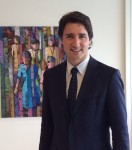The murder of 12 at Charlie Hebdo and the murder of four at a kosher supermarket in Paris last week were not just examples of mass murder, violence to which we as a society have become sadly accustomed. These were deliberate attacks on the core values of a free, democratic, pluralist country.
We have long feared that the West might not respond in a stalwart way to such an incident, so the massive march in Paris Sunday, featuring world leaders, was an inspiration and a signal of hope that the people of France will stand on guard for the values of civilization that are epitomized by the rallying cry of that country’s revolution: liberté, égalité, fraternité.
What happens next will truly impact the future of our democracies. On the one hand, there is the potential that media will legitimately and understandably take baby steps in the direction of self-censorship, for fear that gun-wielding self-proclaimed editors will burst through the doors and kill everyone in range.
On the other hand, there is the potential that, in an effort to prove the opposite point, media (and now, with social media, everyone is a publisher) will saturate the discourse with material that is offensive to Muslims. Already, there has been a spike in attacks against mosques in Europe. Extremists on both sides could enflame this situation badly.
More optimistically, voices of reason, like those on the streets of Paris and at the Vancouver rally last week, may more positively affect the course of events.
Freedom of expression is paramount. In a democracy, where rights come with responsibilities, we would hope that people, including media, would use this right responsibly. Yet, even if they don’t – and it is both outrageous that we have to say it and that it is also at the absolute root of this discussion – there’s no case where gunning offenders down or bombing them is justifiable.
Freedom of expression is central to this discussion but, in a way that seems far too obvious to even state, the bigger issue is that people shouldn’t kill people. The four Jewish men who died at the supermarket are not martyrs to free expression. They are martyrs to just being Jewish.
Ultimately, events will probably lead more people in Europe to conclude, as many have already, that multiculturalism is a failed experiment. Certainly, multiculturalism is imperfect, as is any human endeavor. But it remains the best answer, given the unthinkable alternative, which is racial nationalism of the kind we have seen too much.
More bluntly, multiculturalism is unavoidable. We need to make it work. We cannot run to our corners and demand – what? – that they – whoever “they” are – stay on their side of the world and we – who are “we”? – should stay on ours? Because that is, effectively, the only alternative to multiculturalism. And that is plainly impossible, even if it were desirable in some cases. In today’s world, more than ever before, we are truly one people. We need to start acting in ways that reflect this reality.
There is a great deal of anger and incivility in the world today. In the car, in customer relations, certainly on the relative anonymity of the internet, the things people are saying to one another are rife with intolerance, divisiveness and rage. There are no laws that force us to be civil. Yet, there is a spectrum of the way human beings treat one another and many of us probably envision ourselves as more civil than we may deserve to self-regard.
Good citizenship is not only an obligation for newcomers, remember, it is a duty for all of us. As the people who marched in Paris demonstrated, like those around the world who have stood up, including here in Vancouver, acts of inhumanity are precisely the catalysts for us to redouble our own humanity.

